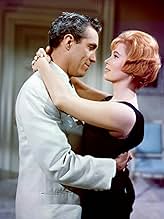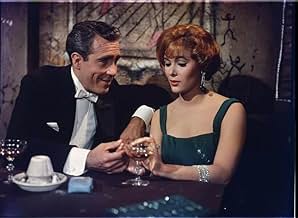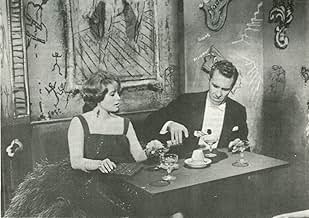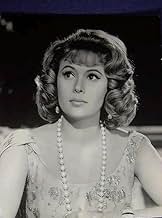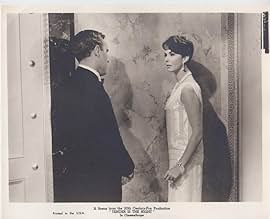- Nominated for 1 Oscar
- 1 win & 1 nomination total
Jason Robards
- Dr. Richard 'Dick' Diver
- (as Jason Robards Jr.)
- Director
- Writers
- All cast & crew
- Production, box office & more at IMDbPro
Featured reviews
Despite David O. Selznick's omnipresence whenever his wife was involved in a film even if it wasn't his own, director Henry King managed to make a fine film adaption of F. Scott Fitzgerald's celebrated autobiographical novel, Tender Is The Night. Jennifer Jones and Jason Robards, Jr. are nothing short of wonderful in the leads.
A lot of the personal lives of both the leads went into roles of Nicole and Dick Diver. Jennifer Jones saw enough tragedy in her life for about five people and saw the inside of mental institutions a few times while on the mortal coil. And Jason Robards love of the grape was also well known.
Robards purportedly is Fitzgerald himself who fell in love with a high flying millionairess Zelda Sayre and the easy living he became accustomed to sapped his creative energy. In this work Robards is a psychiatrist who forgot professional ethics and fell in love with his patient. Zelda Fitzgerald also saw the inside of an asylum, but no one ever affected a lasting cure for her.
The two live in real luxury as American expatriates in Europe and 20th Century Fox spent no small expense turning the locations in Europe like the Riviera, Paris, and Zurich into what they looked like in the Twenties. Bernard Herrmann wrote a musical score that interwove more melodies from that era than I could count.
Robards falls in love with the beautiful Jones as he helps bring her out of her mental illness. The Code was as omnipresent as David O. Selznick and the barest hint of the cause of her illness was made because talk of incest was still a big taboo. It would take Chinatown more than ten years later to bring that sin into the open on screen. One thing that wasn't included from the novel was a theme of miscegenation as well in deference to our Southern audiences still not the beneficiaries of the Civil Rights revolution. Fascinating as to what was considered worse by Hollywood box office standards in 1962.
Joan Fontaine plays Jennifer's older sister and custodian of the family legacy. The father was one of those robber baron tycoons who committed suicide and of course it was that and the incest that drove Jones to her illness. Fontaine totally misreads Robards as a fortune hunter, but since he's pried the family's dirty secret from Jennifer's mind, better to have him in the family. Because of Jennifer's illness Fontaine controls the family purse strings.
Loving Jones and at the same time resentful of being tied financially to her, Robards loses professional detachment. This was something he should have learned from his mentor Paul Lukas who has a small part. Tender Is The Night is an object lesson about not getting involved with a patient personally.
Tom Ewell as a Broadway composer who has lost his muse in alcohol has a good role as a kind of hanger on to the Robards/Jones party world. He's a good ornament to have at a party. I believe his role might be based on Vincent Youmans who gave up his career to both tuberculosis and to a drinking problem. The theme song by Sammy Fain and Paul Francis Webster also serves as a symbol of a lot of unfinished lives. Ewell keeps playing the melody and he can't complete it. When someone else does he takes it all wrong and tragedy ensues.
The title song Tender Is The Night is one of my favorite movie melodies. I have a recording of it by Tony Martin and it received the only Academy Award nomination the film had. The song lost to the title song of another fine film, The Days Of Wine And Roses. Personally I like Tender Is The Night much better.
Tender Is The Night was the farewell directing assignment for Henry King who in his long career directed some of the best films 20th Century Fox ever made. For some reason he's not considered at the very top of his profession and I think it's because he was contracted to one studio and stayed there. I think the reasoning is that if you're the very best you can go from studio to studio and you must be the best if everyone wants you. A contract director like King just gets assignments. But King always did his films with a certain amount elegance to them and so what if he toiled only at one dream factory. Guys like King and Woody Van Dyke and Clarence Brown at MGM always get a short shrift when discussing directors.
Fitzgerald purists will not be crazy about Tender Is The Night, but I think it holds up very well almost fifty years after its first release. Really top flight entertainment.
A lot of the personal lives of both the leads went into roles of Nicole and Dick Diver. Jennifer Jones saw enough tragedy in her life for about five people and saw the inside of mental institutions a few times while on the mortal coil. And Jason Robards love of the grape was also well known.
Robards purportedly is Fitzgerald himself who fell in love with a high flying millionairess Zelda Sayre and the easy living he became accustomed to sapped his creative energy. In this work Robards is a psychiatrist who forgot professional ethics and fell in love with his patient. Zelda Fitzgerald also saw the inside of an asylum, but no one ever affected a lasting cure for her.
The two live in real luxury as American expatriates in Europe and 20th Century Fox spent no small expense turning the locations in Europe like the Riviera, Paris, and Zurich into what they looked like in the Twenties. Bernard Herrmann wrote a musical score that interwove more melodies from that era than I could count.
Robards falls in love with the beautiful Jones as he helps bring her out of her mental illness. The Code was as omnipresent as David O. Selznick and the barest hint of the cause of her illness was made because talk of incest was still a big taboo. It would take Chinatown more than ten years later to bring that sin into the open on screen. One thing that wasn't included from the novel was a theme of miscegenation as well in deference to our Southern audiences still not the beneficiaries of the Civil Rights revolution. Fascinating as to what was considered worse by Hollywood box office standards in 1962.
Joan Fontaine plays Jennifer's older sister and custodian of the family legacy. The father was one of those robber baron tycoons who committed suicide and of course it was that and the incest that drove Jones to her illness. Fontaine totally misreads Robards as a fortune hunter, but since he's pried the family's dirty secret from Jennifer's mind, better to have him in the family. Because of Jennifer's illness Fontaine controls the family purse strings.
Loving Jones and at the same time resentful of being tied financially to her, Robards loses professional detachment. This was something he should have learned from his mentor Paul Lukas who has a small part. Tender Is The Night is an object lesson about not getting involved with a patient personally.
Tom Ewell as a Broadway composer who has lost his muse in alcohol has a good role as a kind of hanger on to the Robards/Jones party world. He's a good ornament to have at a party. I believe his role might be based on Vincent Youmans who gave up his career to both tuberculosis and to a drinking problem. The theme song by Sammy Fain and Paul Francis Webster also serves as a symbol of a lot of unfinished lives. Ewell keeps playing the melody and he can't complete it. When someone else does he takes it all wrong and tragedy ensues.
The title song Tender Is The Night is one of my favorite movie melodies. I have a recording of it by Tony Martin and it received the only Academy Award nomination the film had. The song lost to the title song of another fine film, The Days Of Wine And Roses. Personally I like Tender Is The Night much better.
Tender Is The Night was the farewell directing assignment for Henry King who in his long career directed some of the best films 20th Century Fox ever made. For some reason he's not considered at the very top of his profession and I think it's because he was contracted to one studio and stayed there. I think the reasoning is that if you're the very best you can go from studio to studio and you must be the best if everyone wants you. A contract director like King just gets assignments. But King always did his films with a certain amount elegance to them and so what if he toiled only at one dream factory. Guys like King and Woody Van Dyke and Clarence Brown at MGM always get a short shrift when discussing directors.
Fitzgerald purists will not be crazy about Tender Is The Night, but I think it holds up very well almost fifty years after its first release. Really top flight entertainment.
**spoiler alert**
This movie does not have the greatest reputation in the world. I'd read that Jennifer Jones was too old to play Nicole, that she overacts, that she has no chemistry with Jason Robards, that it was too long, etc.
Well don't believe it!
It DID take me several attempts to watch the whole thing, but that nothing to do with the movie, that had to do with something else. When
I finally saw the whole thing all the way through, I enjoyed it very much and questioned why it does not have more admirers.
It explores many themes, thoughtfully and without exploitation. Should a doctor romance his patient? When does the patient stop being a patient, exactly, and start being a person?
Nicole meets Dick in a sanitarium. She's there for a variety of reasons, none of which sister Joan Fontaine really care to discuss. It has something to do with their father. Nicole eventually is released and runs into Dick years later, and they get married. They have a wonderful life and two children but it starts to fall apart. Not because of Nicole's mental state - actually, as it turns out, she becomes the stable one. But a friend of theirs (Tom Ewell, making a fool of himself as a chronic drunk) dies, their daughter almost dies from alcohol poisoning, and Dick is see with an actress (Jill St. John) at a brawl in a café and their picture makes all the front pages.
Jennifer Jones is prone to be very mannered. In spite of them she's still a favorite, but here she's really very good, she's not too old to play the part, and her chemistry with Robards is believable. Fontaine doesn't do much but enjoy her own wardrobe. As I mentioned, Ewell is a drunk but his death scene (or, rather, the circumstances surrounding it) are the worse thing in the movie. Jill St. John is first seen as a youngster but she matures as the movie progresses..unfortunately, her acting does not improve.
At over 2 1/2 hours, its an investment, but worth your time. Now I want to watch it again. 8/10.
This movie does not have the greatest reputation in the world. I'd read that Jennifer Jones was too old to play Nicole, that she overacts, that she has no chemistry with Jason Robards, that it was too long, etc.
Well don't believe it!
It DID take me several attempts to watch the whole thing, but that nothing to do with the movie, that had to do with something else. When
I finally saw the whole thing all the way through, I enjoyed it very much and questioned why it does not have more admirers.
It explores many themes, thoughtfully and without exploitation. Should a doctor romance his patient? When does the patient stop being a patient, exactly, and start being a person?
Nicole meets Dick in a sanitarium. She's there for a variety of reasons, none of which sister Joan Fontaine really care to discuss. It has something to do with their father. Nicole eventually is released and runs into Dick years later, and they get married. They have a wonderful life and two children but it starts to fall apart. Not because of Nicole's mental state - actually, as it turns out, she becomes the stable one. But a friend of theirs (Tom Ewell, making a fool of himself as a chronic drunk) dies, their daughter almost dies from alcohol poisoning, and Dick is see with an actress (Jill St. John) at a brawl in a café and their picture makes all the front pages.
Jennifer Jones is prone to be very mannered. In spite of them she's still a favorite, but here she's really very good, she's not too old to play the part, and her chemistry with Robards is believable. Fontaine doesn't do much but enjoy her own wardrobe. As I mentioned, Ewell is a drunk but his death scene (or, rather, the circumstances surrounding it) are the worse thing in the movie. Jill St. John is first seen as a youngster but she matures as the movie progresses..unfortunately, her acting does not improve.
At over 2 1/2 hours, its an investment, but worth your time. Now I want to watch it again. 8/10.
This movie was a flop at the time and has been pretty much forgotten, which is a shame. It's a faithful adaptation of F.Scott Fitzgerald's moving story which is a touch lifeless, but still worthwhile.
The plot is ofcourse very good, a love story which is intriguing and very sad. There is perhaps not quite enough emotion throughout most of the film, but by the time the end comes the film has become pretty moving. Jason Robards was definately miscast as Dick Dyver [a good name for a porn star!]but Jennifer Jones shows what a good actress she sometimes could be ,especially when she is displaying her character's 'madness' ,if that's not too strong a word. None of the supporting characters are as interesting as they should be except Jill St John's aspiring actress and there is somehow little feel for the period, but the strength of the story just about carries one through. Mention should be made of Bernard Herrmann's often touching [if a bit self derivative!]music, but having the film's theme song [which he did not write] played endlessly on the piano by one character gets a bit annoying.
Despite it's flaws ,this is a fairly solid romantic drama that probably seemed old fashioned even in 1962, but deserves some reappraisal.
The plot is ofcourse very good, a love story which is intriguing and very sad. There is perhaps not quite enough emotion throughout most of the film, but by the time the end comes the film has become pretty moving. Jason Robards was definately miscast as Dick Dyver [a good name for a porn star!]but Jennifer Jones shows what a good actress she sometimes could be ,especially when she is displaying her character's 'madness' ,if that's not too strong a word. None of the supporting characters are as interesting as they should be except Jill St John's aspiring actress and there is somehow little feel for the period, but the strength of the story just about carries one through. Mention should be made of Bernard Herrmann's often touching [if a bit self derivative!]music, but having the film's theme song [which he did not write] played endlessly on the piano by one character gets a bit annoying.
Despite it's flaws ,this is a fairly solid romantic drama that probably seemed old fashioned even in 1962, but deserves some reappraisal.
Well, c'est la vie.
A wonderful cast and beautiful scenery are the highlights of "Tender is the Night," a 1962 film starring Jason Robards, Jennifer Jones, Tom Ewell, Joan Fonaine, Jill St. John, and Paul Lukas. The film is based on a book by F. Scott Fitzgerald.
Fitzgerald wrote beautiful prose, but much of his work has been difficult to adapt to the screen. He himself worked as a writer in Hollywood but wound up uncredited on most of the scripts and told someone that he did recognize one of his lines in a film that evidently had not been cut from a script.
In this film, Robards plays Dick Driver, a psychiatrist who falls for one of his patients, Nicole (Jones). Nicole is being treated for mental instability, the result of incest (though this is only hinted at). When Dick realizes his feelings, and hers, he quickly distances himself, but she runs into him after she leaves the sanitarium and the two wind up getting married.
Nicole is filthy rich, and the money is controlled by her sister (Joan Fontaine). Dick gets lulled into the good life, the parties, the travel, the luxury, and while he intends to return to his work at the sanitarium and finish a book, he doesn't go. This is mainly because the insecure and sometimes paranoid Nicole is resistant. When he finally returns to the sanitarium, his mentor (Lukas) is dying and the sanitarium has been taken over by a colleague, who only wants Driver's investment. Driver refuses, since he would have to get the money from Nicole, but she insists. But for Driver, it feels like it's all too late.
The acting is superb and Jones, one of my favorites, looks gorgeous throughout. She is somewhat nervous and mannered as Nicole, but that's the character, and she captures her. Robards is strong, emotional, and excellent as the deeply convicted Driver. And how wonderful to see Paul Lukas. I actually recognized his voice and then looked at his face -- I'm so used to seeing him in movies made 20 years earlier that I didn't recognize him at first.
The problem with the film for me is that so much that goes on is beneath the surface -- this can be a fascinating feature, but it is directed at too leisurely a pace by Henry King. The St. John character is never really fleshed out, she darts in and out of the picture; ditto the drunken composer played by Tom Ewell. We just don't know enough about him to care. Joan Fontaine wears some great clothes and acts well, and we do get to know her somewhat.
The other problem is the time in which it is set, which seems a bit generic. It's supposed to be the '20s - I can tell by the music - but not by anything else. The ambiance is '60s.
Nevertheless, Tender is the Night was an ambitious project that probably could have used some judicious editing, but if you're a Jones fan you won't want to miss it.
A wonderful cast and beautiful scenery are the highlights of "Tender is the Night," a 1962 film starring Jason Robards, Jennifer Jones, Tom Ewell, Joan Fonaine, Jill St. John, and Paul Lukas. The film is based on a book by F. Scott Fitzgerald.
Fitzgerald wrote beautiful prose, but much of his work has been difficult to adapt to the screen. He himself worked as a writer in Hollywood but wound up uncredited on most of the scripts and told someone that he did recognize one of his lines in a film that evidently had not been cut from a script.
In this film, Robards plays Dick Driver, a psychiatrist who falls for one of his patients, Nicole (Jones). Nicole is being treated for mental instability, the result of incest (though this is only hinted at). When Dick realizes his feelings, and hers, he quickly distances himself, but she runs into him after she leaves the sanitarium and the two wind up getting married.
Nicole is filthy rich, and the money is controlled by her sister (Joan Fontaine). Dick gets lulled into the good life, the parties, the travel, the luxury, and while he intends to return to his work at the sanitarium and finish a book, he doesn't go. This is mainly because the insecure and sometimes paranoid Nicole is resistant. When he finally returns to the sanitarium, his mentor (Lukas) is dying and the sanitarium has been taken over by a colleague, who only wants Driver's investment. Driver refuses, since he would have to get the money from Nicole, but she insists. But for Driver, it feels like it's all too late.
The acting is superb and Jones, one of my favorites, looks gorgeous throughout. She is somewhat nervous and mannered as Nicole, but that's the character, and she captures her. Robards is strong, emotional, and excellent as the deeply convicted Driver. And how wonderful to see Paul Lukas. I actually recognized his voice and then looked at his face -- I'm so used to seeing him in movies made 20 years earlier that I didn't recognize him at first.
The problem with the film for me is that so much that goes on is beneath the surface -- this can be a fascinating feature, but it is directed at too leisurely a pace by Henry King. The St. John character is never really fleshed out, she darts in and out of the picture; ditto the drunken composer played by Tom Ewell. We just don't know enough about him to care. Joan Fontaine wears some great clothes and acts well, and we do get to know her somewhat.
The other problem is the time in which it is set, which seems a bit generic. It's supposed to be the '20s - I can tell by the music - but not by anything else. The ambiance is '60s.
Nevertheless, Tender is the Night was an ambitious project that probably could have used some judicious editing, but if you're a Jones fan you won't want to miss it.
"Tender is the Night" seemed to be the sort of film Jennifer Jones should not have been making at that time in her career. She was a woman who had emotional problems that seemed uncomfortably close to the problems her character in the film experienced.
The film is based on what is considered F. Scott Fitzgerald's most autobiographical novel. According to some sources, Jennifer Jones' character, Nicole Diver, was based on Fitzgerald's marriage to a highly-strung woman who suffered from severe psychological disorders.
Like Hemingway's "The Sun Also Rises", the film is set among expatriate Americans in Europe in the 1920's. Nicole (Jennifer Jones) is married to psychiatrist Dick Diver (Jason Robards). They are financially well off and their life revolves around serious partying. They even have a resident, alcoholic, piano playing composer, Abe North, played by Tom Ewell, who is frustrated at having a great melody stuck in his system.
We learn through flashback that Nicole had been Dick's patient and there is concern that she may not really be cured and that Dick himself may have issues. Infidelity lurks in every corner, especially when a young starlet takes a fancy to Dick. Eventually Nicole and Dick drift apart as Dick heads deeper into alcoholism (as did Fitzgerald).
Jennifer Jones still exuded that amazing aura and fits the part well; too well if one is aware of her story.
Cary Grant was considered for the part of Dick Diver, but it finally went to Jason Robards. Although he was a brilliant stage and character actor, Robards didn't project the charisma of a Cary Grant, and maybe that's what was needed.
Although the final scenes do pack a punch, for the most part the film seems dry and talky.
There is location work in Switzerland and France with brilliant scenes at the end shot on the French Riviera, but much of the interior studio work is flat and uninspired. Also, Bernard Herrmann's score doesn't marry with the fabric of the film the way his scores did for "Vertigo", "North By Northwest" and many others.
The actors are photographed mainly at the middle distance with few close-ups. Possibly Selznick forbade closing in on Jennifer Jones who was about 43 at the time. She looked fabulous though with a tightly bobbed hairstyle.
Big and glossy, the film is interesting more for the behind-the-scenes story, but for Jennifer Jones fans, she is still a good reason to seek it out.
The film is based on what is considered F. Scott Fitzgerald's most autobiographical novel. According to some sources, Jennifer Jones' character, Nicole Diver, was based on Fitzgerald's marriage to a highly-strung woman who suffered from severe psychological disorders.
Like Hemingway's "The Sun Also Rises", the film is set among expatriate Americans in Europe in the 1920's. Nicole (Jennifer Jones) is married to psychiatrist Dick Diver (Jason Robards). They are financially well off and their life revolves around serious partying. They even have a resident, alcoholic, piano playing composer, Abe North, played by Tom Ewell, who is frustrated at having a great melody stuck in his system.
We learn through flashback that Nicole had been Dick's patient and there is concern that she may not really be cured and that Dick himself may have issues. Infidelity lurks in every corner, especially when a young starlet takes a fancy to Dick. Eventually Nicole and Dick drift apart as Dick heads deeper into alcoholism (as did Fitzgerald).
Jennifer Jones still exuded that amazing aura and fits the part well; too well if one is aware of her story.
Cary Grant was considered for the part of Dick Diver, but it finally went to Jason Robards. Although he was a brilliant stage and character actor, Robards didn't project the charisma of a Cary Grant, and maybe that's what was needed.
Although the final scenes do pack a punch, for the most part the film seems dry and talky.
There is location work in Switzerland and France with brilliant scenes at the end shot on the French Riviera, but much of the interior studio work is flat and uninspired. Also, Bernard Herrmann's score doesn't marry with the fabric of the film the way his scores did for "Vertigo", "North By Northwest" and many others.
The actors are photographed mainly at the middle distance with few close-ups. Possibly Selznick forbade closing in on Jennifer Jones who was about 43 at the time. She looked fabulous though with a tightly bobbed hairstyle.
Big and glossy, the film is interesting more for the behind-the-scenes story, but for Jennifer Jones fans, she is still a good reason to seek it out.
Did you know
- TriviaThe Divers are based on real-life couple Gerald and Sara Murphy, friends and patrons of the famous, including the author of this story, F. Scott Fitzgerald. Poet Archibald Macleish once said of the Murphys that "there was a shine to life wherever they were".
- GoofsThe American flag adorning the child's sand castle has its stars arranged in the staggered rows of 5 and 6 stars as in the current 50 stars arrangement. An American flag of the 1920's would have had its stars in the 6 rows of 8 arrangement.
- Quotes
Mr. Albert Charles McKisco: What's your place in the economy of life, Barban?
Tommy Barban: I shoot
Mr. Albert Charles McKisco: Just any old thing, huh?
Tommy Barban: Well, er... buffalo in Africa, tigers in India, Bolsheviks in Europe...
Mr. Albert Charles McKisco: Don't you ever get the urge to do anything?
Tommy Barban: Yes. I would like to restore the Holy Roman Empire.
- ConnectionsFeatured in 20th Century-Fox: The First 50 Years (1997)
- SoundtracksTender Is the Night
Music by Sammy Fain
Lyrics by Paul Francis Webster
Sung by an off-screen vocal group during the opening credits
- How long is Tender Is the Night?Powered by Alexa
Details
Box office
- Budget
- $3,900,000 (estimated)
- Runtime
- 2h 22m(142 min)
- Color
- Aspect ratio
- 2.35 : 1
Contribute to this page
Suggest an edit or add missing content




